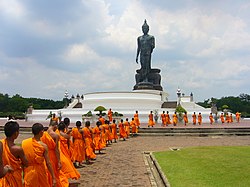Bhikṣu
Jump to navigation
Jump to search
bhikṣu (P. bhikkhu; T. dge slong དགེ་སློང་; C. biqiu 比丘), commonly translated as "monk," has at least three possible meanings:
- (1) someone who begs;
- (2) someone who has taken the highest level of Buddhist ordination; and
- (3) someone who has destroyed mental afflictions.[1]
Bhikṣu who have taken the highest level of Buddhist ordination are commonly referred to as "fully-ordained monks"; these monks observe the highest type among the eight types prātimokṣa vows.[1] They are distinguished from novice monks (śrāmaṇera), who observe a more limited set of vows.
A fully-ordained female monastic is called a bhikṣuṇī (P. bhikkhuni).
The Dhammapada states:[2]
- A shaven head
- doesn't mean a contemplative.
- The liar observing no duties,
- filled with greed & desire:
- what kind of contemplative's he?
- But whoever tunes out
- the dissonance
- of his evil qualities
- — large or small —
- in every way
- by bringing evil to consonance:
- he's called a contemplative.
Notes
- ↑ 1.0 1.1
 དགེ་སློང་, Christian-Steinert Dictionary
དགེ་སློང་, Christian-Steinert Dictionary
- ↑
 Dhp XIX: The Judge, Dhammatalks.org
Dhp XIX: The Judge, Dhammatalks.org
Further reading
- Inwood, Kristiaan. Bhikkhu, Disciple of the Buddha. Bangkok, Thailand: Thai Watana Panich, 1981. Revised edition. Bangkok: Orchid Press, 2005. ISBN 978-974-524-059-9.
 Kieschnick, John (2004), "Monks", in Buswell, Robert E., Encyclopedia of Buddhism, vol 2, Macmillan Reference USA, pp. 565–568
Kieschnick, John (2004), "Monks", in Buswell, Robert E., Encyclopedia of Buddhism, vol 2, Macmillan Reference USA, pp. 565–568 Samuels, Jeffrey (2004), "Monasticism", in Buswell, Robert E., Encyclopedia of Buddhism, vol 2, Macmillan Reference USA, pp. 556–560
Samuels, Jeffrey (2004), "Monasticism", in Buswell, Robert E., Encyclopedia of Buddhism, vol 2, Macmillan Reference USA, pp. 556–560
